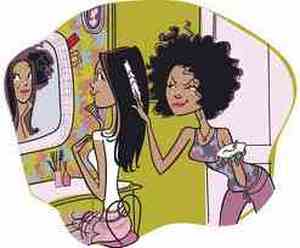
Charlotte Marshall Templeman
Title: Knotty by Nature
“Girl, I’m gonna get me a Puerto Rican so my kids can have good hair!” “Your hair is so nappy, you need a perm.” “Her hair is so pretty, she got that good stuff.” “I wish I had good hair but I was born with this nigga hair.” For years we have heard these types of comments said about the hair of African American women. The question is where has this thinking come from? Is this a reflection of self-hate or just simply not being comfortable with the hair you’re in? Recently 16 year old gold medal winner Gabrielle Douglass has come under fire and cruel insults about her hair. There has been a massive support in her favor but there are still those who feel her hair is not “good” enough. With the major accomplishment she has achieved at such a young age, why is her hair on trial? Instead of giving insults, we should all be showing her and the world how proud and honored we are. So once again, I ask is this a reflection of self-hate or just simply not being comfortable with the hair you’re in.
When Africans Americans first arrived in this country, we came wearing locks, braids and twist. Our hair was naturally coarse but our styles were unique. We embraced our heritage by wearing our hair this way. It was one of the only things we could still call our own. As our time in America progressed the way we thought about our hair changed. We were told by the slave master that our hair was “nappy and like wool” and not “good.” This began our thinking of good and bad hair and how we perceived ourselves. Light skinned African Americans whose hair was finer and more manageable was looked at as more valuable while the darker skinned African Americans were looked at as unattractive and worthless. It did not take long for African Americans to internalize this as the truth, thus beginning a separation by skin complexion and hair.
Wanting to be accepted by white America we began to develop their ideologies and what beauty meant to them, thus adopting it as our own. Madame C.J. Walker has been categorized as the first female self-made millionaire woman who developed a hair care line which would allow African American women to transform their hair from coarse to straight in a matter of hours. Although her care line was very successful, she came under scrutiny for encouraging African American women to look white. During the 1930’s “conking” became just as popular. Conking was a treatment that straightened the hair but burned the scalp. If conking was not done, wigs were worn to cover the hair. Over the years African American women have gotten perms and their hair pressed by the straightening comb to look a certain way. This new look came with a major price to the hair. If it was not done right it could cause hair loss and burning of the scalp because of the chemicals. Was the image of beauty we were trying to adopt worth it?
During the 60’s a new revelation emerged, a Renaissance. This rebirth brought about timeless literature from some of the greatest writers of all time. It also was a time where we began to re-embrace our heritage and our natural beauty. Activist such as Angela Davis wore her Afro proud while James Brown sang, “I’m black and I’m proud. Say it loud.” African American women began to look at what made them different as the catalyst to what makes them beautiful. If wigs were worn it was to enhance the way a woman wanted to look, but it did not define her beauty. Many different hair styles were worn and the African American woman was versatile. She was beautiful.
Fast forward to today. African American women remain versatile in the way they wear their hair and the way they dress. We have set trends to which others try to imitate. Take the braids, for instance. Bo Derek loved the look so much that she had her hair braided and beaded, a look we wore in Africa generations before coming to this country. Unfortunately some of us continue to think that the straighter the hair, the better we look. From celebrities to the average woman, weaves are worn. Some wear them to look a certain way while others wear them because they hate the naturalness of their own hair. In hating their hair some African Americans will go to extremes to look like they have “good hair.” It’s as if the slave master has re-emerged in all the corner stores where hair can be bought and sewn in or glued in. The subliminal messages being you are more valuable and beautiful if you wear your hair straight as opposed to wearing it natural. The problem is not wearing weaves, wigs or extension. I believe that a woman should do whatever she needs to make herself feel good. However, the problem arises when you demean your natural beauty and adopt others’ thinking of what beauty is. In order to love yourself completely you have to accept yourself completely. That entails coarse hair, big hips, broad nose and thick lips. African American women are beautiful and always have been. Our beauty is unique and timeless. Our beauty is original.
 RSS Feed
RSS Feed
